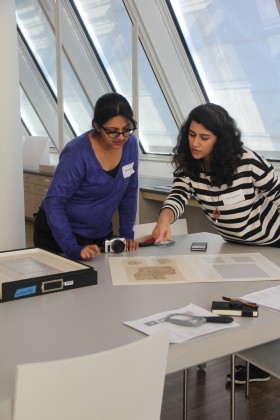From November 29 – December 9, the South Asia Institute hosted two artists from South Asia as part of its Visiting Artist Program. Komal Shahid Khan, from Islamabad, Pakistan, and Meenakshi Sengupta, from Kolkata, India, spent their time at Harvard attending classes, meeting with students and faculty, giving a public seminar, and had the opportunity to display their work on campus.
The artists visited several undergraduate classes where they were invited to speak about their work and engage with students. Courses included ‘History and Sexuality in the Modern West’ taught by Nancy Cott, Jonathan Trumbull Professor of American History, ‘Comparative Politics of Gender Inequality’ taught by Ana Catalano Weeks, College Fellow in the Government Department, ‘Gender and the Making of Modern South Asia,’ taught by Catherine Warner, College Fellow in the Department of South Asian Studies, and ‘Leaning in, Hooking up: Visions of Feminism and Femininity in the 21st Century’ taught by Phyllis Thompson, Lecturer on Studies on Women, Gender, and Sexuality. The artists were also invited to the Department of Visual and Environmental Studies for an informal gathering with concentrators and affiliates.
During their visit, Khan and Sengupta were exposed to the various arts-related resources at Harvard. Rachel Parikh, Calderwood Curatorial Fellow for South Asian Art, Harvard Art Museums, led a session for the artists in the Museum’s Art Study Center, and allowed the artists to access several pieces from the Museum’s collection. Lamia Joreige, Rita E. Hauser Fellow, Radcliffe Institute and a renowned visual artist and filmmaker from Lebanon invited the artists to her studio to speak about their artistic process.
“We experienced a lot. Visiting the museums and seeing the original works there, that means a lot to me,” Sengupta said.
During their time, the two artists collaborated on an interactive performance piece about Partition, an idea that formed when they met in Cambridge. (Video below).
“We had these preconceived ideas: She’s from Pakistan, and I’m from India. There is an unconscious boundary between she and me. But we can not feel it while we are sharing our experience at Harvard. But there is something that divides us,” Sengupta said.
Both artists said the experience was extremely enriching for their own work, and valued the opportunity to show their art to a new audience. “We are addressing common issues, but there are cultural differences. I loved the artists talks and discussions about our practice. Seeing how people from a different part of world react to their work – it’s valuable,” Sengupta said
“Coming together and deciding new things, planning new projects, you get more motivated and enthusiastic to start on new projects when you go back to your country,” Khan said.
Khan is a Visual Artist. She graduated from the University of Punjab, Lahore, Pakistan in 2012 and then did her Master in Fine Arts from Fatima Jinnah Women University Rawalpindi, Pakistan with specialization in Miniature Painting. Sengupta holds a B.V.A. 2011 (Painting), from the University of Calcutta, Kolkata, India and a M.F.A. 2013 (Painting) with distinction (Gold Medal), from the Maharaja Sayajirao University, Baroda, India. India. In her work, she uses traditional pictorial representation to push formal and aesthetic conventions producing new meaning by using wit and irony to explore gender identity and complexities in contemporary life.
See Khan’s work and learn more.
See Sengupta’s work and learn more.
Khan and Sengupta’s collaborative piece about Partition:

